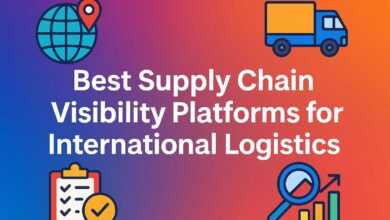Mobile Apps vs. Web Platforms: Choosing the Right Custom Software for Real Estate

The digital shift of the real estate industry is happening at a breakneck pace, with 93% of buyers beginning their property search online and over 73% using mobile applications to research, investigate and transact. The tactical decision: customized mobile applications or web platforms, could define the client experience, agent workflow and the competitiveness of your real estate business in the market. Navigating a Real Estate Software Development Company or sourcing specialized Custom Software Development does matter, but more importantly, the decision to evaluate the pros and cons of each option as the best fit for your company is essential. This article serves as a comprehensive guide on selecting the best correct technologies for the success of your real estate business.
All About The Digital Revolution in Real Estate
The real estate industry is rapidly changing with revolutionizing innovations in PropTech. Today’s clients rightfully demand easy-to-use, robust platforms that deliver data at the point of sale when buying, selling, or managing investment properties. Custom software applications have been the backbone of competitive agencies helping them reach new heights in efficiency and customer personalization. What continues to lay heavy is the same decision: to fund a mobile app or web platform? As both continue to grow, selecting a mobile app or web platform requires balance between reach, feature sets, and future growth with a technology partner who has subject expertise.
Advantages of Mobile Apps
Mobile applications provide a level of user interaction and convenience that is unmatched. Nearly three-quarters (74%) of today’s homebuyers are using smartphones or tablets to search for properties—attracted to more efficient navigation, offline access, and targeted notifications.
Better User Experience (UX) and Engagement: The experience with an app is smoother with the ability to receive suggestions based on your preferences, faster delivery of information, and simply a different way to directly access information, making the likelihood for you to re-engage twice as high versus a site that is only accessible via a web browser.
Offline Support / Accessibility: Apps store fundamental pieces of information locally, allowing users to view and edit listings, calendars, and documents, while offline or in less than ideal connectivity situations.
Device-based Functionality: The in-app tools use the device’s Global Positioning System (GPS) to show nearby listings, the camera for local scanning, virtual, or video tours, or the push notifications for your agent, client updates, and safety alerts.
Better Performance and Speed: Mobile apps provide an inherently better experience because they are written to run natively, versus a browser, which is limited by its capabilities when handling more complex tasks like watching a 3D home tour video, using a mortgage calculator, or chatting with an agent.
Better Security and Data Protection: The app can offer more data encryption service or local data storage, even biometric authentication, which is a better or better possible solution for protecting sensitive client and transactional data.
Use Cases for Mobile Apps
- Buyer/Agent Connectivity: Instant instant exchange of messaging, availability scheduling, and on-the-go negotiation features bring together buyers and agents in real time.
- Virtual Property Experiences & AR/VR Tour: Engaging multimedia gives buyers a true sense of properties from anywhere in the world.
- Agent Tools (CRM, Lead Generation): Your apps allow agents to effectively manage pipeline opportunities, send follow up reminders, and access key property information while in the field.
Advantages of Web Platforms
Web platforms developed through Custom Software Development Services provide broad access and integration for intricate business processes. Nearly 97% of buyers utilize real estate agents’ websites, reflecting the importance of flexible and content-rich web interfaces.
- Broader Audience: In web platforms, agents can reach desktop, tablet, and mobile users anywhere in the world without any downloads or other hardware.
- Cost-effective and Rapid Development: The unique codebase allows for maximum cost-effectiveness and its nature provides immediate global reach as well as feature updates.
- Easier and Instant Updates: Having a backend, agents can deploy instantaneous updates, enhancements, and modifications to bugs, and users don’t even have to do anything.
- Content-heavy, Complex Workflows: While mobile applications can handle a good amount of content, a web platform’s user experience performance significantly outpaces most apps when handling searches, evaluating large amounts of data, analytics, and bulk connection or communication.
- Search Engine Accessibility: As organic listings, web platforms will continue to rank and drive traffic from search engines, and in turn, will act as hubs for marketing and search efforts to drive traffic and compete.
Use Cases for Web Platforms
- Online Real Estate Marketplaces: The ability to search, filter, and compare information gives buyers, sellers, and investors everything they need in one interface.
- Back-office Administration and Data Measurement: Agencies can manage listings, transactions, agent activities, and marketing campaigns at scale.
- Investing and Financial Information: Real estate intelligence tools provide analytics, project forecasts, and ROI tracking for institutional investors.
The Hybrid Approach: Progressive Web Apps (PWAs)
What are PWAs?
Progressive Web Apps (PWAs) combine mobile and web: An app-like experience within the browser, offline, push notifications, and microphone/camera/contacts access and use without downloading an app.
Benefits of PWAs: Combining the Best of Both Worlds
PWAs provide fast loading, offline caching, native user experience while being cross-device and detected. And all that comes without worrying about ongoing costs for native mobile and web development and UX separately.
When to Consider a PWA for Real Estate
PWAs are very good for property disposal agencies that need as much accessibility for everyone, a dynamic experience and low-cost development cycle. PWA are web app overload with mobile-device performance if you require complex data, workflow, and real-time communications.
How to Make the Right Choice for Your Business
- Determine Goals & Audience: Is your main objective direct client engagement, efficiency for agents, or volume of marketplace management? Know your users: Millennial and Gen Z users are inclined to interact through mobile; institutional users may be desktop-first.
- Evaluate Budget & Timeline: Delivery through Native apps involves separate development (iOS, Android), will have higher initial costs; web and PWAs allow you to write…. and will save time to market later.
- Core Features & Functionality: Listings search, AR tours, CRM, analytics, communication, notifications – all of these features should relate back to the strengths of the two platforms mentioned today; further consider integrations or hybrids, multi overwriting technology will converge!
- Long-Term Plan & Scalability: Think about the next set of needs: cross-platform capabilities, API service shares, technology for emerging AI/ML tools, and support the growth of agents by appointing partners you can trust – ayl for example a Real Estate Software Development Company.
Conclusion: A Strategic Decision for Long-Term Success
Mobile applications and web solutions are essential components of the contemporary real estate industry. Mobile applications can be strong on engagement, performance, and mobile functionality, while web solutions deliver the most significant accessibility, depth of search capabilities, and managed complexity. Progressive web applications enjoy the benefits of both the mobile and web spaces to maximize the possibility of success. Start with a minimum viable product by rolling out the straight to the client features, then develop the site to meet demand, ensure technological choice, and continue to evolve the product based on app goals. Working with Real Estate App Development Services gives you a solution package that serves your current needs and future expansion goals. With careful planning and data, your agency can develop a digital services platform that stands the test of time to support growth and market position.



